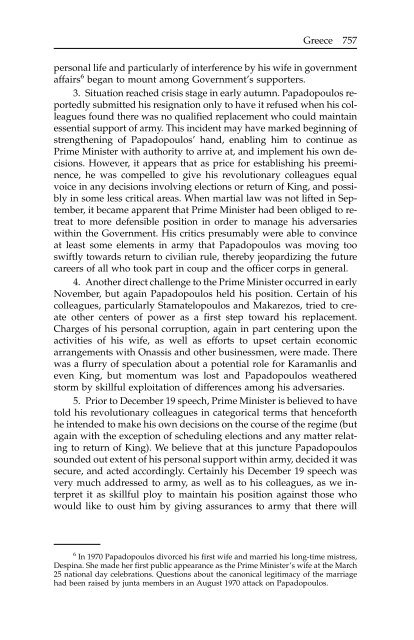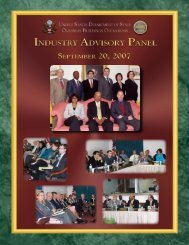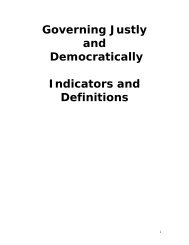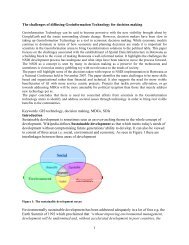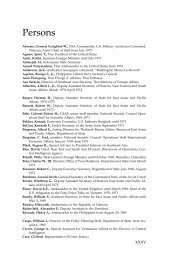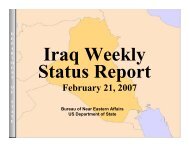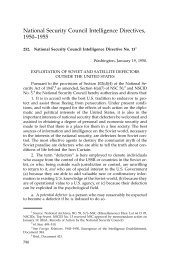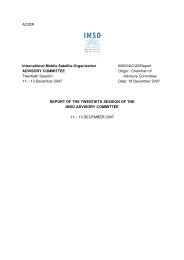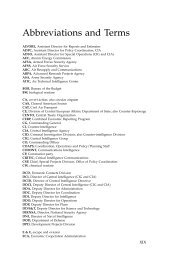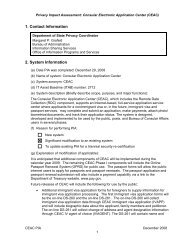Greece - US Department of State
Greece - US Department of State
Greece - US Department of State
Create successful ePaper yourself
Turn your PDF publications into a flip-book with our unique Google optimized e-Paper software.
<strong>Greece</strong> 757<br />
personal life and particularly <strong>of</strong> interference by his wife in government<br />
affairs 6 began to mount among Government’s supporters.<br />
3. Situation reached crisis stage in early autumn. Papadopoulos reportedly<br />
submitted his resignation only to have it refused when his colleagues<br />
found there was no qualified replacement who could maintain<br />
essential support <strong>of</strong> army. This incident may have marked beginning <strong>of</strong><br />
strengthening <strong>of</strong> Papadopoulos’ hand, enabling him to continue as<br />
Prime Minister with authority to arrive at, and implement his own decisions.<br />
However, it appears that as price for establishing his preeminence,<br />
he was compelled to give his revolutionary colleagues equal<br />
voice in any decisions involving elections or return <strong>of</strong> King, and possibly<br />
in some less critical areas. When martial law was not lifted in September,<br />
it became apparent that Prime Minister had been obliged to retreat<br />
to more defensible position in order to manage his adversaries<br />
within the Government. His critics presumably were able to convince<br />
at least some elements in army that Papadopoulos was moving too<br />
swiftly towards return to civilian rule, thereby jeopardizing the future<br />
careers <strong>of</strong> all who took part in coup and the <strong>of</strong>ficer corps in general.<br />
4. Another direct challenge to the Prime Minister occurred in early<br />
November, but again Papadopoulos held his position. Certain <strong>of</strong> his<br />
colleagues, particularly Stamatelopoulos and Makarezos, tried to create<br />
other centers <strong>of</strong> power as a first step toward his replacement.<br />
Charges <strong>of</strong> his personal corruption, again in part centering upon the<br />
activities <strong>of</strong> his wife, as well as efforts to upset certain economic<br />
arrangements with Onassis and other businessmen, were made. There<br />
was a flurry <strong>of</strong> speculation about a potential role for Karamanlis and<br />
even King, but momentum was lost and Papadopoulos weathered<br />
storm by skillful exploitation <strong>of</strong> differences among his adversaries.<br />
5. Prior to December 19 speech, Prime Minister is believed to have<br />
told his revolutionary colleagues in categorical terms that henceforth<br />
he intended to make his own decisions on the course <strong>of</strong> the regime (but<br />
again with the exception <strong>of</strong> scheduling elections and any matter relating<br />
to return <strong>of</strong> King). We believe that at this juncture Papadopoulos<br />
sounded out extent <strong>of</strong> his personal support within army, decided it was<br />
secure, and acted accordingly. Certainly his December 19 speech was<br />
very much addressed to army, as well as to his colleagues, as we interpret<br />
it as skillful ploy to maintain his position against those who<br />
would like to oust him by giving assurances to army that there will<br />
6 In 1970 Papadopoulos divorced his first wife and married his long-time mistress,<br />
Despina. She made her first public appearance as the Prime Minister’s wife at the March<br />
25 national day celebrations. Questions about the canonical legitimacy <strong>of</strong> the marriage<br />
had been raised by junta members in an August 1970 attack on Papadopoulos.


